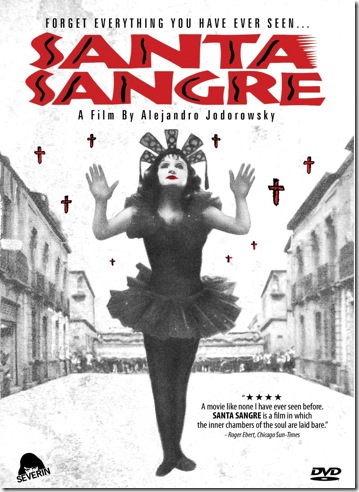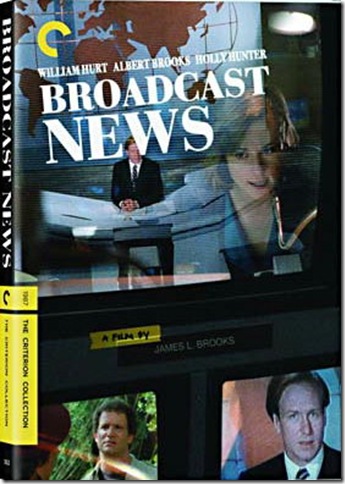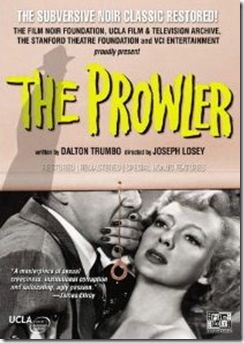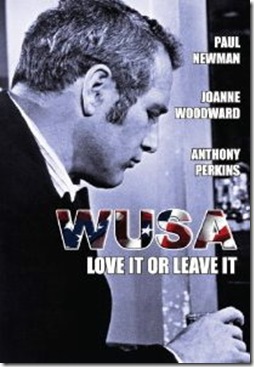Santa Sangre (MPI)
Release date: Jan. 25
Standard list price: $21.99
So Santa Sangre, one of cult director Alejandro Jodorowsky’s most controversial films, is finally released on a beautiful Region 1 DVD, ensuring all of the red paint spilling forth from the body orifices will look as vivid as it should.
Jodorowsky has an intensely devoted following of adventurous aficionados of horror and experimental cinema – a cult that never included me. Reviewing El Topo – the director’s influential 1970 “hippie Western,” to quote J. Hoberman – at the time of its Anchor Bay DVD release a few years back, I rather decimated it: “A curious and pretentious bit of nostalgia that strains for relevance or even basic entertainment … He gave us a movie so of its time — filled with bare breasts and penises, scandalous scenes of guys kissing guys and gals kissing gals, rape, old-time religion, flagellation and self-immolation as a mirror to Vietnam — that the ostentatious importance he attaches to his spelled-out surrealism comes off today as a dated counterculture goulash long hyped as art by a blank generation desperate for something different.”
Santa Sangre is another beast entirely. After nearly a decade of inactivity in the movie business, the 1989 psychological slasher found the director embracing the Grand Guignol poetry he excelled at, only this time with an extra helping of Gothic expressionism. Best of all, the film is, for the most part, absent the leaden religious symbology that weighed down his 1970s antiestablishment jumbles.
Flashing backward and forward in time, the story centers on Fenix (Jodorowsky’s son Alex), a young boy who, while growing up in a Mexican circus, watches his adulterous father – the circus’s knife-thrower – dismember his mother’s arms and slit his own throat after being caught in the act with the tattooed woman. Sent to a mental institution after the traumatic experience left him in a mute and animalistic state, Fenix eventually rises as an adult, Christ-like and apparently cured (some religious symbolism remains, but it’s only peripheral to the film’s appeal).
Except he’s crazier than ever, hallucinating harrowing scenes from his childhood as well as current terrors such as a python emerging from his trousers. He spends his days shadowing his armless mother, acting as her appendages for everything from walking to eating to murdering people. Serially killing a series of women – most of whom inhabit a freak-show milieu similar to Fenix’s circus upbringing – at his mother’s bidding, Fenix believes he has no control over his hands. Only the salvation of a deaf-mute girl from his past (played by Sabrina Dennison, an actual deaf-mute) can save him.
Influenced as much by the giallo horror excess of the Italian masters (Cluadio Argento, brother of Suspiria’s Dario, co-wrote the screenplay) and Roger Corman’s exceptional Edgar Allen Poe adaptations, Santa Sangre does not appear to be “about” anything other than the masterfully directed horror-camp we see on screen, and it’s all the better because of it.
Still, no praise of Jodorowsky’s directorial intensity or visual poetry can be offered without acknowledging the head-shaking silliness of his English-dubbed dialogue. None of Jodorowsky’s movies has the screenwriting chops to match his visual ambition, a flaw his supporters never seem to concede.
Because Jodorowsky is such an eccentric character, and the stories behind his films are so unorthodox, the extra features on his discs are more worth your time than most studio-packaged supplemental fluff. MPI’s two-disc Santa Sangre release is a generous package, anchored by the feature-length, seven-part documentary Forget Everything You Have Ever Seen: The World of Santa Sangre, featuring all-new interviews with cast and crew. Even better is a 1990 documentary show from the United Kingdom titled For One Week Only: Alejandro Jodorowsky, in which a straight-forward, non-reverential film journalist exposes some of Jodorowsky’s flaws to his face.
These documentaries reveal fascinating trivia about the director: Santa Sangre’s circus plotline is in part inspired by his own experience growing up in a circus; he liked to dress entirely in purple; as an aspiring artist, he studied mime under Marcel Marceau; and in his 10-year absence from moviemaking, he became one of Paris’ foremost masters in the mystical art of tarot reading.
Jodorowsky is also refreshingly blunt and non-hypocritical. “I don’t care what the public thinks!” he exclaims about his controversial films, a clarion call to artists everywhere but a philosophy rarely adhered to in the movie-making establishment. And when the British reporter probes him about the misogynistic nature of his movies, where the male characters are always more three-dimensional than the females, he responds by saying, “That’s because I hated women!” Needless to say, Alejandro Jodorowsky could never expect to succeed in politics.
Broadcast News (Criterion)
SLP: $19.49
Release date: Jan. 25
Word has it Aaron Sorkin is working on a new series set in the backstage world of a prime-time cable news show (with Keith Olbermann rumored to be a contributor). If he’s looking for drama, romance, humor and social commentary in a television news setting, Sorkin couldn’t find a better blueprint than this 1987 classic from James L. Brooks, reissued in a scrumptious double-disc set from Criterion. Set long before the encroaching obsolescence of the network news telecast, Brooks’ behind-the-scenes love triangle doesn’t feel at all dated, having the prescience to predict the dominance of infotainment over hard news years before the development of the Fox News Channel. Brooks’ script is witty and elegant, and the casting – Holly Hunter as a feisty but damaged news producer, Albert Brooks as a passionate but meek reporter, and William Hurt as a vapid but telegenic anchor-hunk – have become indelible landmarks of a an era and a culture. The bonus disc includes a documentary about Brooks’ career, an alternate ending, deleted scenes and an interview with a CBS news producer who inspired Hunter’s character.
The Prowler (VCI)
SLP: $14.99
Release date: Feb. 1
For years, this 1951 kitchen-sink noir, written by blacklisted screenwriter Dalton Trumbo and directed by art-house favorite Joseph Losey, has become something of a “lost classic” thanks its out-of-circulation status. The character of a prowler, snooping outside the home of dishy housewife Susan Gilvray (Evelyn Keyes) is essentially a red herring: We never discover the so-called prowler’s identity, but his presence incites the appearance of Webb Garwood, a smitten cop (Van Heflin). Webb returns to the house again and again to seduce Susan, whom we learn is slaving through a loveless marriage to a local disc jockey. Webb hatches a plot to make Susan’s husband go away, but the plan falls apart, as noir plots are wont to do. The Prowler is a very good noir, if elevated erroneously to the level of suppressed masterpiece by circumstances outside of its control.
WUSA (Olive Films)
SLP: $22.49
Release date: Feb. 8
WUSA has, for years, been one of a small handful of Paul Newman pictures not released on DVD; in fact, it’s never even been released on any home video format until now. It’s easy to see why. Though stocked with an all-star cast – Newman, Joanne Woodward, Anthony Perkins, Laurence Harvey and Cloris Leachman – and directed by Cool Hand Luke’s Stuart Rosenberg, WUSA is dreadfully dull. Its pacing is like watching concrete form. Basing the movie on Robert Stone’s novel Hall of Mirrors, Rosenberg offers up a dreary, somnambulistic depiction of America – and New Orleans, in particular — as a decaying corpse of titty bars, run-down five-and-dimes and ghettos of abject penury. In this squalid 1970 milieu, failed musician Rheinhardt (Newman) lands a job on a homegrown, right-wing hate-talk station espousing hard-hat values to Richard Nixon’s silent majority. What sounds like a prophetic study of a proto-Glenn Beck is anything but, particularly because Stone (as screenwriter) and Rosenberg choose to ignore any on-screen depiction of Rheinhardt’s on-air talent; we’re supposed to assume that he’s whipping up the unwashed masses into a psychotic frenzy, while we waste time watching him develop a sluggish relationship with Woodward’s abused trollop. Curiously, Newman once said this is the most important picture he ever made, but compared with a film as compelling and decade-defining as Nashville or The Parallax View, WUSA has not an iota to say about the times we lived in. Olive Films’ transfer is fine, but the sound on this disc is abysmally bad; the roar of ambient noise is deafening, while intimate conversations are inaudible.



